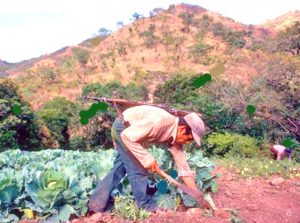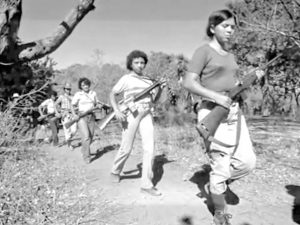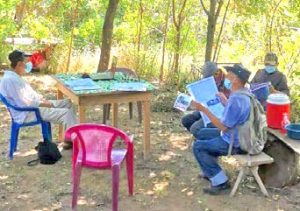Our Fight Today: Mobilize Masses for International Communism

EL SALVADOR, December 15—A veteran comrade farmworker spoke at a meeting of ICWP members and Red Flag readers in solidarity with the mass struggle of farmers and workers in India. They discussed the valuable lessons of the mass armed struggle in El Salvador from 1980 to 1992. The following is part of his speech:
To begin, I want to salute our brother and sister comrades in India. I think they are carrying out a very important struggle. We join in solidarity with them, if only morally.
The world today is evolving. And I think that in these struggles many things will be achieved that will lead us forward to an equitable life for everyone. I’m talking about communism.
We would like to share some things with our comrades in India. For example, how the organized movement here began to carry out a war, and the ideological mistakes that we made in El Salvador with the FMLN.
It did not come about “foolishly and blindly,” as we say here. We were masses, a people who already had a high degree of organization. We had already prepared our organization many years earlier. Land was acquired in Honduras and we had safe houses in the biggest cities of the country, where our families would stay. Others, including some women and youths, also stayed to confront the political armed struggle.
When we began, we had members in international organizations that would collaborate with this movement: The Red Cross and other European and American organizations. We dedicated ourselves full time to fighting the enemy in different ways, with the struggle in the streets, and with the political struggle. We began the military-political struggle with five organizations, which worked in a united way. At least, in theory, there was a unity that became the Farabundo Martí Front for National Liberation (FMLN).

Communist Organization and Understanding
Now we understand, as farmworker members of the International Communist Workers’ Party, that the organization must be internationalist, with the Party collectively leading our individualist decisions that the capitalist system implants. And we understand that communism must be disseminated to the entire base.
How could we be successful in a war against an enemy nine times better armed, supported by two million dollars a day from the US government? According to the calculations of the capitalist enemy, they were going to destroy us in a few hours. But we had comrades that we sent into the army so that later they could teach us how to handle weapons and the tactics of war. We built a working class trained in arms. We organized in many ways. We had an administrative-logistical part, too. I think this part is the same as what you are doing, there in India.
Self-critically, our ideological foundation was very weak. The leadership of the Front did not believe in the capacity of the working class to understand what a communist system based on the collective would be like. They thought that only a group of intellectuals could understand this new way of life.
Some children of the petit bourgeoisie (small bosses) joined. Our parents began to help with money and animals. We chose some comrades as administrators who would distribute equitably what there was in the place where we were, so we could survive. There was enormous intelligence in those people.
We did this to such a degree that, during the years of the war, 1980-1992, we were always supplied with food in the guerilla camps. We had great help from the people that we sent to the refugee camps, (where our families were) in Honduras. There they produced vegetables, corn, cereals, clothes, and shoes. These people learned to make almost everything. They even produced bread for their consumption and ours. In the 12 years of war, many young people never knew money. Everything was produced and consumed collectively. Today there are friends, Red Flag readers and active comrades who participate in ICWP who were there.

When most of the girls and boys who went to the refugee camps got older, they eagerly and enthusiastically told us, “I’m going to El Salvador, I’m going to fight there!” They came. We prepared them. They were trained and educated. They learned what a revolution was, although perhaps not communist, as the Party is doing it today worldwide.
In this way we grew and grew, reaching a point that our enemies feared us. They then knew that there was a group of rural and city workers who fought with everything; who spared no efforts at any time, and at no juncture, to achieve our advance. We achieved everything in the field of battle. And if they had valued how important teaching communist ideology is, as the ICWP does now, today would be another story.
The Present Moment
I admire you comrades, also those of you in India and other places where ICWP is developing. You are now in another moment. We fought in a moment in time. I believe that, in that, we will have to make the difference later. We all learn from the experiences of the world’s working class, their mistakes and their great achievements.
Now you, in India. I believe that it is your turn to build a new moment, where you have to apply all your intelligence and communist development for this struggle.
Let’s go forward! Our class will win! And we will win. And we will always win.
Venceremos!

